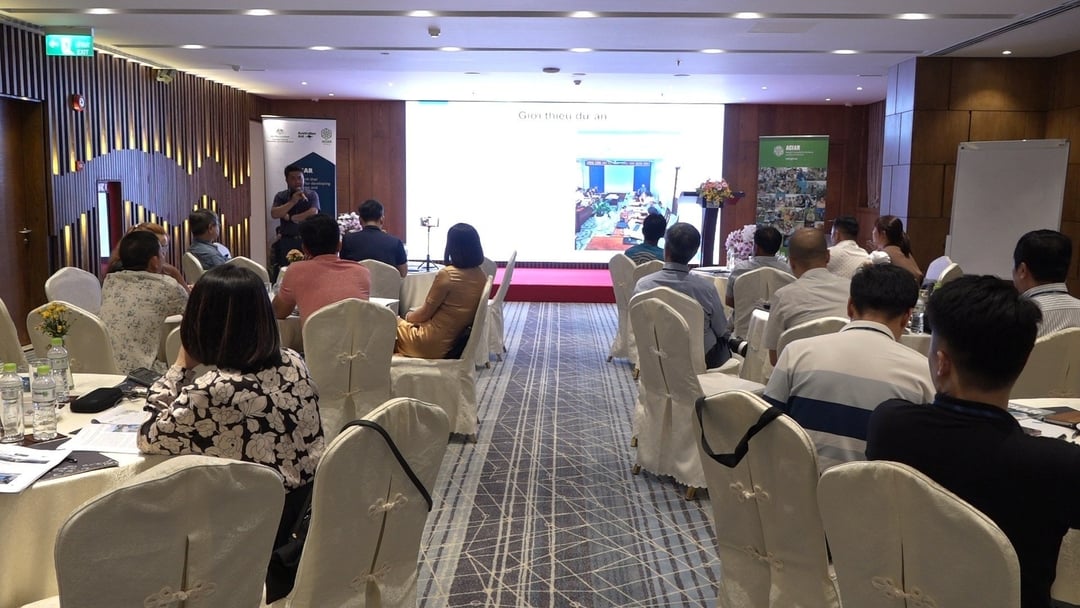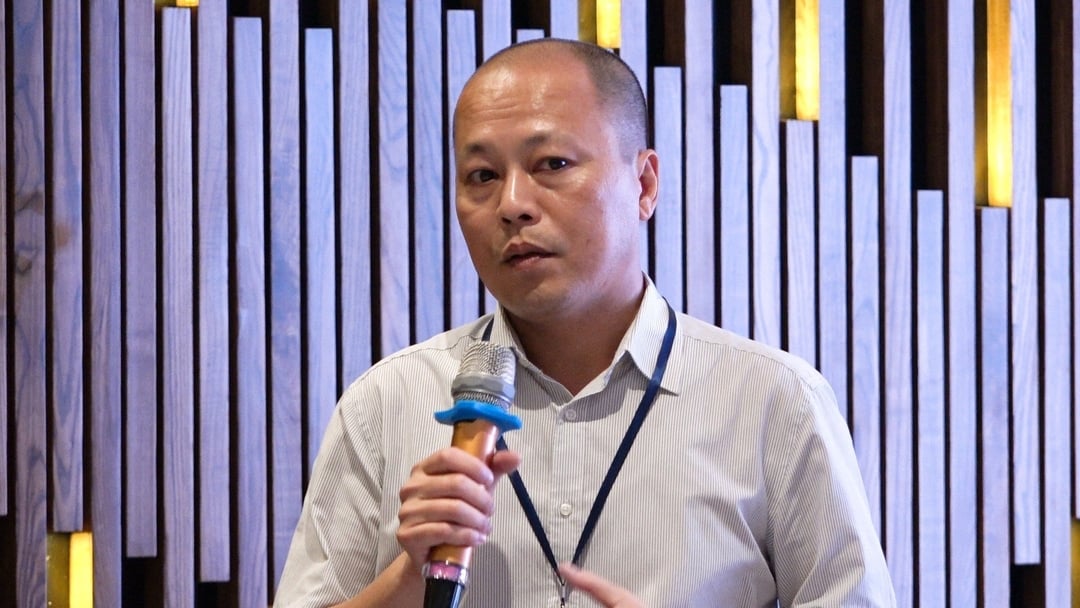May 21, 2025 | 04:46 GMT +7
May 21, 2025 | 04:46 GMT +7
Hotline: 0913.378.918
May 21, 2025 | 04:46 GMT +7
Hotline: 0913.378.918
On the afternoon of May 19, the Australian Center for International Agricultural Research (ACIAR) held a meeting to meet its partners and visit the center's project in Nha Trang City (Khanh Hoa province). The program celebrates the 30th anniversary of the Australian Center for International Agricultural Research (ACIAR) operations in Vietnam.

Meeting with partners and project visits of ACIAR took place on the afternoon of May 19 in Nha Trang City, Khanh Hoa province.
ACIAR is implementing the ACIAR - Vietnam Cooperation Strategy (2017-2027). The strategy is built on the mutual recognition that the relationship between ACIAR and Vietnam has evolved from donor-recipient to an equal partnership and co-investment to create opportunities for poor people in both rural and urban areas through the development of comprehensive agricultural systems. Also, the strategy focuses on developing new opportunities and changes for women working in research, production, and agribusiness.
The ACIAR project in Vietnam has helped build a multi-billion dollar acacia industry, generating significant economic benefits. More than 250,000 smallholder farmers are working in this industry, creating products that will be exported from wood, pulp, and wood pulp boards and supporting the furniture industry.
Another study funded by ACIAR has yielded significant achievements in women's economic empowerment. It has newly developed and expanded the oyster farming industry involving 2,500 Vietnamese families, producing 15,000 -30,000 tons of oysters per year.
Regarding the highlights of the Center's activities over the years, Mr. Tran Nam Anh, Deputy Head of the ACIAR Representative Office in Vietnam, said that ACIAR has invested in 243 research projects in Vietnam worth AUD 157.5 million.
ACIAR has supported more than 120 Vietnamese scientists to participate in postgraduate training programs and leadership capacity-building programs in Australia through ACIAR's scholarship programs. Meanwhile, the rate of return on investment of ACIAR's projects in Vietnam is 90:1 (1 AUD investment brings value 90 AUD to Vietnam).
The ACIAR-Vietnam strategic partnership has helped address Vietnam's complex challenges through improved productivity, poverty reduction, and more effective natural resource management. In which priority is given to projects with co-investment and private-sector participation through inclusive agribusiness systems.

Mr. Tran Nam Anh, Deputy Chief Representative of ACIAR in Vietnam, spoke at the meeting.
In 2023, ACIAR and MARD will sign a new cooperation agreement, focusing on why and how to cooperate to strengthen mutual benefits and co-investment capabilities.
ACIAR commits a budget of AUD 23 million for projects related to Vietnam over the next 5 years towards long-term research and contributing to the transformation of the food and food system.
At the meeting, ACIAR introduced two typical projects in ACIAR's cooperation: "Improving professional skills to support sea cucumber farming in the Philippines and Vietnam" and "Developing mussel farming pearl industry in Tonga and Vietnam".
These are two typical projects in the cooperation relationship between ACIAR and partners, achieving success in scientific research and bringing research results to market, businesses, and continuing to develop projects with companies.
Previously nominated by the Vietnam Academy of Agricultural Sciences (VAAS) for his significant contributions to Vietnam's agriculture, Deputy Minister of Agriculture and Rural Development Nguyen Hoang Hiep presented the Friendship Medal to Professor Andrew Campbell, CEO of ACIAR.
"This award recognizes the achievements that ACIAR has achieved through its excellent partnership over the years. Vietnam is an essential partner of ACIAR, and we are delighted that this relationship has transformed from an aid partnership into a long-term technical partnership to support Vietnam's sustainable agricultural development goals," said Professor Andrew Campbell, CEO of ACIAR.
Mr. Nguyen Huu Ninh, Deputy Director of the Department of Science, Technology and Environment (MARD), said that ACIAR has significantly contributed to the agricultural sector in recent years. Projects funded by ACIAR from science and technology improve human capacity to create valuable products for export.
As an example with the fisheries sector, Mr. Ninh said that the projects funded by ACIAR had met the practical needs of the people, especially applied to production, helping to create livelihoods in difficult areas, coastal areas, as well as gender mainstreaming, are also concerned, with the participation of women in these projects, contributing to the value creation of agricultural products in general and fisheries in particular.
Regarding the ACIAR - Vietnam Cooperation Strategy (2017 - 2027), the representative of the Ministry of Agriculture and Rural Development said that cooperation in the past and the future is based on equality and mutual benefits for projects. Investment and collaboration will benefit both sides in science and technology, partnership, and commercial products, creating a foundation and bringing good results to the two countries' communities.
Translated by Ha Phuc

(VAN) Japan's grant aid project contributes to capacity building, promoting organic agricultural production, and fostering sustainable community development in Dong Thap province.

(VAN) For years, the CRISPR-Cas9 genome technology has been reshaping genetic engineering, a precision tool to transform everything from agriculture to medicine.

(VAN) Vietnam aims to become a 'leader' in the region in the capacity and managing effectively soil health and crop nutrition.
![Reducing emissions from rice fields: [Part 1] Farming clean rice together](https://t.ex-cdn.com/nongnghiepmoitruong.vn/608w/files/news/2025/05/05/z6509661417740_a647202949c539012a959e841c03e1d3-nongnghiep-143611.jpg)
(VAN) Growing clean rice helps reduce environmental pollution while increasing income, allowing farmers to feel secure in production and remain committed to their fields for the long term.
/2025/05/19/5136-1-144800_230.jpg)
(VAN) The Nghe An Provincial People's Committee has just approved the list of beneficiaries eligible for revenue from the Emission Reductions Payment Agreement (ERPA) in the North Central region for the year 2025.

(VAN) 14 out of 35 domesticated elephants in Dak Lak province have had their living conditions improved, with 11 of them currently participating in the non-riding elephant tourism model.

(VAN) Muong Nhe Nature Reserve hopes that being upgraded to a national park will lay the foundation for forest protection efforts to be carried out in a systematic, modern, and sustainable manner.